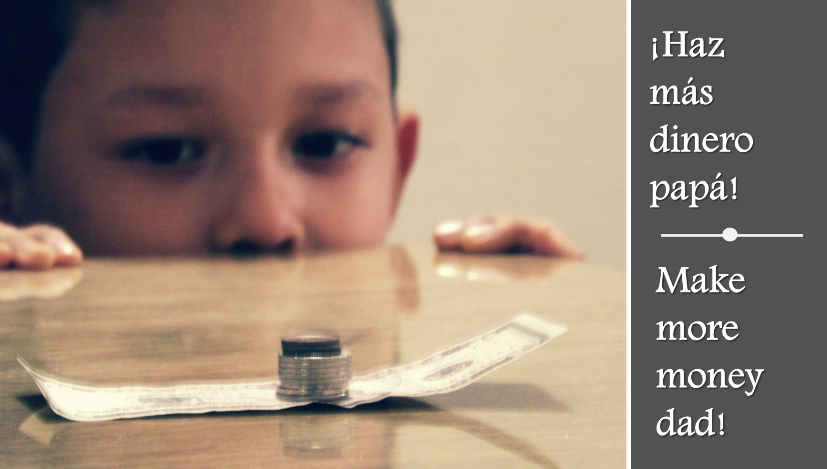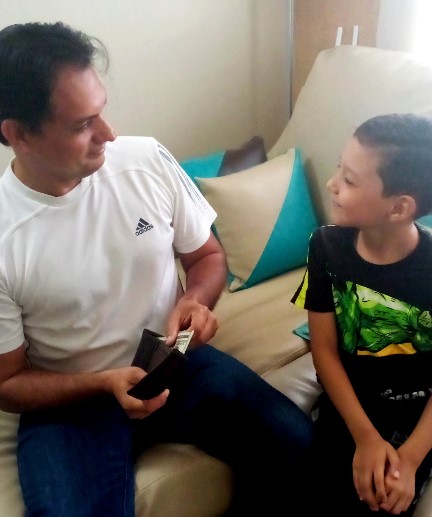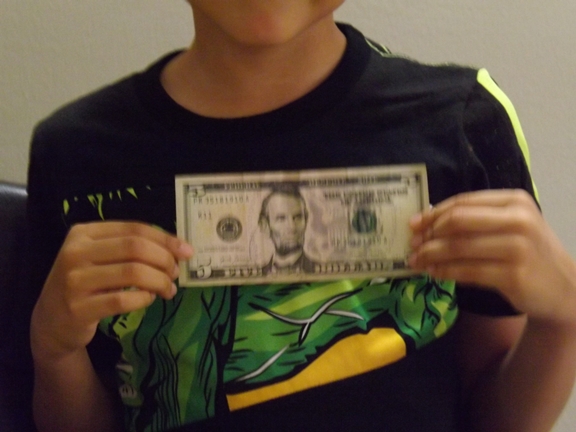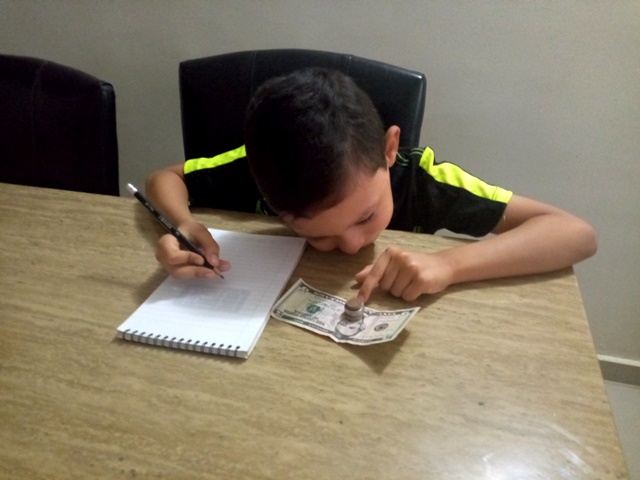Hola queridos amigos de Motherhood. ¿Cuántas veces hemos ido al mercado y los niños quieren que compremos algo que no está en el presupuesto de la compra? A veces es solo un dulce y podemos darles el gusto, pero otras veces puede ser un juguete u otra cosa que no es posible comprar en ese momento, y respondemos que no tenemos dinero, pero ¿entienden la respuesta?
Hello dear friends of Motherhood. How many times have we gone to the market and the children want us to buy something that is not in the shopping budget? Sometimes it's just a candy and we can indulge them, but other times it may be a toy or something else that is not possible to buy at that moment, and we respond that we don't have money, but do they understand the answer?

Fuente: @emiliomoron.
El dinero debe ser un tema recurrente en cualquier hogar, los adultos platicamos mucho sobre ello y utilizamos dinero a diario, y en cierto punto, los niños como buenos observadores, empiezan a comprender que cuando compramos algo hay un intercambio de dinero por ese producto; yo me di cuenta de este proceso evolutivo en mi hijo, en casa si quiere algo solo lo pide, pero fuera de casa si quiere algo su lenguaje es diferente, y dice “cómpralo”. Eso quiere decir que ya entiende que cuando quiere algo debemos comprarlo, lo que debe entender ahora es que no siempre podemos comprar lo que quiere, y es buen momento para que hablemos sobre el valor del dinero.
Money should be a recurring theme in any home, adults talk a lot about it and use money daily, and at a certain point, children as good observers, begin to understand that when we buy something there is an exchange of money for that product; I noticed this evolutionary process in my son, at home if he wants something he just asks for it, but outside the house if he wants something his language is different, and he says "buy it". That means that he already understands that when he wants something we must buy it, what he must understand now is that we cannot always buy what he wants, and it is a good time for us to talk about the value of money.
¡Haz más dinero papá! // Make more money dad!
Estoy seguro que esta es una respuesta que a muchos padres nos ha tocado escuchar cuando, ante la pregunta de si podemos comprarle algo, lanzamos nuestra frase muy adulta “no hijo, no tenemos dinero” lo que detona en ellos esa y otras respuestas como “pero usa la tarjeta”, “saca más dinero del banco”, o no sé si les ha pasado a ustedes, pero mi hijo me dijo una vez “usa tus monedas de internet” haciendo referencia a las criptomonedas.
I am sure this is an answer that many of us parents have heard when, when asked if we can buy something for them, we throw our very adult phrase "no son, we don't have money" which triggers in them this and other answers like "but use the card", "take more money out of the bank", or I don't know if it has happened to you, but my son once told me "use your coins from the internet" referring to cryptocurrencies.

Fuente: @emiliomoron.
Y es que cuando los adultos adquirimos cosas, los niños solo ven que a cambio de ellas entregamos papel o monedas que expresan una cantidad, o entregamos una tarjeta de plástico que pasan por una máquina. Los adultos relacionamos el valor de las cosas con su precio, es el sistema que hemos creado para darle sentido al mundo económico, pero para los niños el precio es un concepto difícil de manejar.
And the thing is that when adults acquire things, children only see that in exchange for them we hand over paper or coins that express an amount, or we hand over a plastic card that they pass through a machine. Adults relate the value of things with their price, it is the system we have created to make sense of the economic world, but for children the price is a difficult concept to handle.
Quizás nos parezca simple, es algo de nuestro día a día, le asignamos valor a las cosas según nuestra escala personal, pero para los niños es un tema complejo. Cuando salen de compras con nosotros, ellos solo ven que vamos tomando cosas de los estantes, cosas que llevamos apuntadas en una lista, algunas que les interesan como las galletas y los cereales, otras que no, a veces nos ven valorando si un producto es caro o barato, esta marca u otra; y luego, antes de salir de la tienda, efectuamos el intercambio, las cosas que llevamos en el carrito de compras por una determinada cantidad de dinero, que pagamos en efectivo o usando una tarjeta.
It may seem simple to us, it is something we do every day, we assign value to things according to our personal scale, but for children it is a complex issue. When they go shopping with us, they only see us taking things from the shelves, things that we have written down on a list, some that interest them like cookies and cereals, others that don't, sometimes they see us evaluating whether a product is expensive or cheap, this brand or another; and then, before leaving the store, we make the exchange, the things we carry in the shopping cart for a certain amount of money, which we pay in cash or using a card.

Fuente: pexels.com.
Eso es lo que ocurre ante sus ojos, así van adquiriendo el concepto de que las cosas debemos comprarlas para que luego sean nuestras, y a medida que van creciendo van manejando este concepto de forma natural, incluso lo incorporan en sus juegos y sus expresiones.
That is what happens before their eyes, so they acquire the concept that we must buy things so that they can be ours, and as they grow up, they handle this concept in a natural way, even incorporating it in their games and expressions.
Hablemos del valor de las cosas // Let's talk about the value of things
Recuerdo una oportunidad en la que saqué de una gaveta una bolsa con muchas monedas, mi hijo se asombró y dijo “Wow has encontrado un tesoro, tienes muchas monedas!” es evidente que estaba relacionando cantidad con valor, fue difícil explicarle como muchas monedas apenas sumaban el billete de más baja denominación.
I remember an opportunity in which I took out of a drawer a bag with many coins, my son was amazed and said "Wow you have found a treasure, you have many coins!" it is evident that he was relating quantity with value, it was difficult to explain to him how many coins barely added up to the lowest denomination bill.
Pero como les dije, es un proceso gradual, no hay porque apurarlos, a temprana edad no es bueno que los niños se preocupen por el dinero, no es bueno que estén preocupados por poseerlo, que lo vean como una necesidad, pero si deben aprender sobre responsabilidad y uso adecuado, cuántas veces hemos visto niños hacer una pataleta porque los padres no le compran algo, o que. Cuando seden y le dan el gusto, lo desechan casi de inmediato. Por eso, aunque sea un tema muy abstracto para ellos, debemos hablar con los niños sobre el dinero desde los valores como responsabilidad, solidaridad y equidad.
But as I told you, it is a gradual process, there is no reason to rush them, at an early age it is not good for children to worry about money, it is not good for them to be worried about possessing it, to see it as a necessity, but they should learn about responsibility and proper use, how many times have we seen children throw a tantrum because their parents do not buy them something, or what. When they give in and indulge, they throw it away almost immediately. Therefore, although it is a very abstract topic for them, we must talk to children about money from values such as responsibility, solidarity and equity.
Si lo hacemos bien, si entienden que el dinero lleva asociado un esfuerzo para obtenerlo, y debemos gastarlo con responsabilidad, notaremos en ellos una gran evolución, cambiaran de “papá cómprame algo” a la pregunta “¿papá tienes dinero para comprarme algo?”
If we do it right, if they understand that money has an associated effort to obtain it, and we must spend it responsibly, we will notice in them a great evolution, they will change from "dad buy me something" to the question "dad do you have money to buy me something?"

Fuente: @emiliomoron.
¿Y cómo les enseñamos el valor de las cosas? // And how do we teach them the value of things?
Bueno, está claro que no podemos poner a nuestros hijos a trabajar para que sepan de donde proviene el dinero, compren cosas y le den un valor de acuerdo a cuanto les costó obtenerlas, pero hay algunas estrategias que me han servido con mi hijo para que vaya entendiendo el valor del dinero.
Well, it is clear that we cannot put our children to work so that they know where the money comes from, buy things and give them a value according to how much it cost them to obtain them, but there are some strategies that have helped me with my son to help him understand the value of money.
- Usar equivalencias: / Use equivalencies:
A veces cuando vamos de compras y ve un juguete que le gusta pero que no puedo comprarle en ese momento, trato de mostrarle a cuantos productos de la compra equivale el costo del juguete, y que por eso en ese momento no podemos comprarlo.
Sometimes when we go shopping and he sees a toy that he likes but I can't buy it for him at that moment, I try to show him how many products the cost of the toy is equivalent to, and that is why we can't buy it at that moment.
- Planificar la compra de algo que nos han pedido: / Plan the purchase of something that we have been asked to buy:
Si observo que el juguete que ha visto realmente le gusta, le digo que planificaremos su compra, no solo voy y se lo compró, le hago saber que cuando reciba el pago de un determinado trabajo podremos comprarlo, lo he hecho en dos oportunidades y creo que ha podido comprender que comprar cosas tiene asociado un trabajo que nos permite conseguir el dinero que cuestan.
If I observe that the toy he has seen he really likes, I tell him that we will plan his purchase, I don't just go and buy it for him, I let him know that when I receive the payment for a certain job we will be able to buy it, I have done it twice and I think he has been able to understand that buying things has a job associated with it that allows us to get the money they cost.
- Permitirle gastar algo de dinero: / Allow him to spend some money:
recientemente le he dicho que puede comprar algo con una determinada cantidad de dinero, de esta manera se dio cuenta que no podía comprar todo lo que quería, sino aquello que cubría esa suma, y también que debió establecer preferencias.
Recently I have told him that he can buy something with a certain amount of money, in this way he realized that he could not buy everything he wanted, but only what covered that amount, and also that he had to establish preferences.

Fuente: @emiliomoron.
- Hablarles, siempre que sea posible, sobre personas con una situación diferente a la nuestra: / Talk to them, whenever possible, about people with a different situation than ours:
En mi país no es extraño encontrar personas, e incluso niños, pidiendo dinero en las calles, lo que me ha permitido hablarle a mi hijo sobre como a veces el dinero es de difícil acceso para ellos, también hemos hecho algunas donaciones de ropa que ya no le queda y juguetes que ya no usa, eso al principio fue todo un tema porque no quería deshacerse de sus cosas, quizás se los cuente en otro post, pero finalmente pudo ver que con eso ayudó a mejorar la situación de otro niño. Incluso su abuelo le comenta como fue su niñez y que él se fabricaba sus propios juguetes, y que no existían ni los teléfonos ni las consolas de videojuegos, y que aun así tuvo una niñez feliz.
In my country it is not uncommon to find people, and even children, asking for money on the streets, which has allowed me to talk to my son about how sometimes money is difficult to access for them, we have also made some donations of clothes that no longer fit him and toys that he no longer uses, that at first was quite an issue because he did not want to get rid of his things, maybe I will tell you about them in another post, but finally he could see that with that he helped to improve the situation of another child. Even his grandfather tells him about his childhood and that he made his own toys, and that there were no phones or video game consoles, and that he still had a happy childhood.
A veces como padres queremos brindarles a nuestros hijos todo lo que no tuvimos, pero debemos evitar enviar mensajes confusos sobre el dinero, sin transmitirles la presión por su falta o dejarles tener todo lo que quieran, ya que enseñarles el valor que tienen las cosas derivará en ellos hábitos de consumo responsables.
Sometimes as parents we want to give our children everything we did not have, but we must avoid sending confusing messages about money, without transmitting pressure for their lack or let them have everything they want, because teaching them the value of things will derive in them responsible consumption habits.
Cuando somos niños sólo vemos el producto que nuestros padres compran, pero no entendemos todo el proceso que hay detrás de eso, así lo veía yo de niña, afortunadamente viví en la época más prospera de mi familia y tuve todo lo que quise, lo más gracioso es que mis juegos favoritos eran en el patio de mi casa con mucha tierra y árboles 🤣
Me parece excelente que le enseñes a tu hijo el valor del dinero, es una manera de que el entienda que todo tiene un valor, yo recuerdo que desde mi chica me gustaba ahorrar,, de hecho el dinero que mi papá me daba para la merienda lo iba guardando para comprarme lo que yo quisiera, y aunque mi papá me compraba todo lo que yo necesitaba y aún más, para mí era una satisfacción no depender siempre de el.
Esa es otra técnica darle un dinero y que ellos aprendan a administrarlo porque luego no habrá más, por ejemplo lo podemos hacer semanal o quincenal o según las posibilidades.
Saludos.
Hola @mirel0510, gracias por pasar a leer, yo también disfrute de esos juegos jaja... Y creo que indiferentemente de las condiciones, prosperas o no, los niños deben comprender el valor de las cosas, así pueden aprender a ahorrar como en tu caso, hay muchas estrategias, y la de una mesada es una que consideraré más adelante. Gracias por tu nutrido comentario, mis saludos!
Hola. Esta muy buena la lectura, mi niño ya tiene 13 años y eso que haces esta muy bien, e empleado alguno de esos metodos y ahora el lleva las cuentas de las cosas pequeñas que hay que comprar. Vivo en Venezuela, tengo un solo niño ya adolescente y me pregunto como haran los que tienen 3 y 4 niños. Muy interesante la lectura.
Hola @daysissuleiman, me alegra que te gustara la lectura, que bueno que has implementado algunas de estas estrategias, especialmente en Venezuela hay que saber manejar muy bien el dinero. Saludos y gracias por tu comentario.